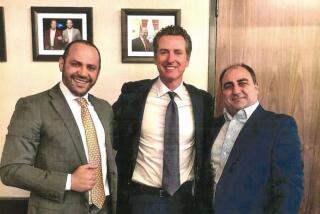False-Arrest Claim Nets $1.3 Million : Courts: Cal State wrestler spent 7 months in jail, missing Olympics, before being acquitted. Jury voted award after hearing that evidence in drug case was fabricated.
- Share via
FULLERTON — The day after Ardeshir Asgari won a $1.3-million judgment against the Los Angeles Police Department in a wrongful-arrest lawsuit, he went to work as Cal State Fullerton’s wrestling coach a happy man.
“I’m just so happy that justice was done,” said Asgari, a 29-year-old first-year coach whose arrest by an LAPD narcotics officer in 1987 and subsequent seven-month incarceration robbed the amateur wrestler of a shot at the 1988 Olympics.
Jurors who heard Asgari’s civil suit against the city of Los Angeles found in his favor after his lawyer argued that evidence in the criminal case was fabricated by a “dirty and corrupt cop.”
A decision to appeal has not been made, said Deputy City Atty. Debra Gonzales, who represented Los Angeles.
Gonzales defended narcotics officer Roberto Sanchez, saying that despite the judgment, Sanchez “was a cop just doing his job.”
Asgari claimed in court that his arrest was politically motivated and engineered by an Iranian police informant whom Sanchez had used. Asgari claimed that the informant was working for the Iranian government.
Asgari defected from Iran in 1982 and became an All-American wrestler at Cal State Fullerton in 1986.
Asgari was a member of Iran’s army wrestling team at the time he and an uncle defected, during the military world championships in Caracas, Venezuela. Many of his relatives held high-ranking government jobs in Iran.
“To show you how tense things were, his father (who remained in Iran) took an oath with his hand on the Koran saying he would kill his son for defecting,” said Steven A. Silverstein, Asgari’s attorney.
The police case against Asgari involved an allegation that he was selling $35,000 worth of heroin to a police informant as three Los Angeles police detectives watched in December, 1987. Much of the case against Asgari had focused on whether he picked up a briefcase containing heroin.
Asgari spent more than seven months in jail awaiting trial and was eventually acquitted in the criminal case in July, 1988. Before his arrest, he was a two-time NCAA qualifier for the Titans at 158 pounds and placed sixth in the NCAA meet in 1986, his junior season. He won 34 matches and lost six that year and won 36 and lost four as a senior, when he was ranked second in the nation by Amateur Wrestling News.
Prosecutors had alleged that Asgari arranged several meetings with police informants and provided a sample of the drugs in a Fullerton parking lot.
During his criminal trial, Asgari said he was set up by an Iranian man whom he had befriended because he felt sorry the man had no friends and no money. The informant was identified as Mohammed Bassir. Asgari testified that he wasn’t sure what was in the briefcase but thought it might be dirt.
“I never touched the briefcase. They said I did, and then they visited me at my home in Fullerton and left the case so I could put my fingerprints on it,” Asgari said.
In the civil suit, police officers who were called to testify were evasive, Silverstein said.
Silverstein accused the LAPD of being vindictive after the arrest when they seized as alleged drug profits $26,000 that Asgari and his wife had saved.
“Without the couple’s money, which we proved in court was being saved by his wife’s earnings as a chemist, Asgari couldn’t hire a lawyer to defend himself,” said Silverstein, who turned the case down three times before he took it because of Asgari’s inability to pay.
As for Asgari, he is glad the trial is over.
“As an athlete, it was not easy sitting in the courtroom eight hours a day. I was mentally tired. It was the worst pressure I’ve ever felt, worse than any wrestling match,” he said.
But he said the million-dollar judgment was not sweet justice.
“If they told me right now that you can take $1 million or be in the Olympics as a participant, I’ll be honest with you. I worked out for 17 years. It was a big part of my life and I would really have to pick the Olympics,” he said.
More to Read
Sign up for Essential California
The most important California stories and recommendations in your inbox every morning.
You may occasionally receive promotional content from the Los Angeles Times.












